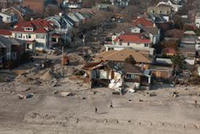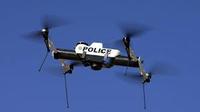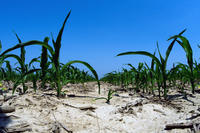-
Salt Lake Community College to offer homeland security program
According to statistics from the U.S. Department of Labor, the need for emergency management professionals, protective service workers, and police and sheriff’s patrol officers is likely to increase more than 33 percent between 2011 and 2018. The Utah Board of Regents has approved the first Homeland Security and Emergency Management associate of applied degree in the state at Salt Lake Community College (SLCC).
-
-
NY to buy, demolish beachfront homes, make way for storm buffers

New York governor Andrew Cuomo plans to use $400 million in federal funding to buy beachfront homes as part of a broader plan to reshape the New York coastline so the state is better prepared for sea level rise, surges, and storms. The plan is to raze the purchased homes and leave to shore front vacant. Some properties would be turned into dunes, wetlands, or other natural buffers. Other parcels could be combined and turned into public parkland.
-
-
More states consider laws to limit the use of drones by police

The Federal Aviation Administration (FAA) appears ready to allow the use of drones in the United States, by both law enforcement agencies and private citizens, almost with no restrictions. Experts predict that by the end of the decade, there will be about 30,000 drones flying over the United States. Legislators in at least eleven states want to impose limits on the use of UAVs as worries grow that the unregulated use of drones would erode the liberties of Americans.
-
-
Massachusetts moves against unscrupulous compounding pharmas
State regulators in Massachusetts have shut down or cited thirty-two of the state’s forty compounding pharmacies as a result of a nationwide fungal meningitis outbreak. The outbreak killed forty-five people and sickened 696, who required hospitalization.
-
-
Miles tax may soon replace gas tax as a way to fund infrastructure maintenance
With infrastructure around the country in a state of disrepair, many states and lawmakers are trying to find a way to fund improvement of roads and bridges. The federal gasoline tax brings in fewer dollars each year, and now some lawmakers and transportation experts are considering the idea of taxing citizens by how far they drive each year instead of the amount of gasoline they buy each year.
-
-
Springfield, Illinois, faces infrastructure woes
As is the case with other cities, the infrastructure of Illinois’ capital, Springfield, is decaying. Experts told the city council that it would take $86.6 million over the next three years to shore up the city’s streets and sewer system, and $22.5 million a year thereafter to maintain it. The city is now grappling with how to raise the necessary funds.
-
-
New clean coal technology provides energy without burning
A new form of clean coal technology reached an important milestone recently, with the successful operation of a research-scale combustion system. The technology is now ready for testing at a larger scale. For 203 continuous hours, the combustion unit produced heat from coal while capturing 99 percent of the carbon dioxide produced in the reaction.
-
-
December, January the top two months in terms of gun purchases in U.S.
New figures released by the FBI show that Americans, during December and January, have been buying guns in record numbers. Analysts say that behind the surge in gun purchases are two events: the Newtown, Connecticut mass shooting and the moves by the Obama administration to introduce – and, in the case of assault weapons, reintroduce – gun control measures. The FBI figures show that in January, the agency performed 2,495,440 gun background checks, initiated by gun sellers before they sold a gun to a customer.
-
-
Labor unions join campaign for immigration reform
The immigration reform debate continues to grab the headlines, and labor unions are now entering the ring, hoping that organizing immigrant workers can boost the unions’ shrinking ranks.
-
-
Wastewater from fracking is often highly radioactive
New studies have found that waste from fracking operations can be highly radioactive. A geological survey reported that millions of barrels of wastewater from unconventional wells in Pennsylvania and conventional wells in New York are 3,609 times more radioactive than the federal limit for drinking water, and 300 times more radioactive than a Nuclear Regulatory Commission limit for nuclear plant discharges.
-
-
Climate change threatens public health, safety, economy along U.S. coasts
A new technical study from the U.S. National Oceanic and Atmospheric Agency (NOAA) and the U.S. Geological Survey (USGS) reports that the effects of climate change will continue to threaten the health and vitality of U.S. coastal communities’ social, economic, and natural systems. All U.S. coasts are highly vulnerable to the effects of climate change such as sea-level rise, erosion, storms, and flooding, especially in the more populated low-lying parts of the U.S. coast along the Gulf of Mexico, Mid-Atlantic, northern Alaska, Hawaii, and island territories. The report says that the financial risks associated with both private and public hazard insurance are expected to increase dramatically.
-
-
U.S. tech companies hope visa reform for high-skilled immigrants is near
U.S. technology companies hope that what appears to be a more bi-partisan approach to immigration reform will not overlook the need to address the issue of high-skilled immigrants. The current number for H-1B visas fir skilled immigrants is 65,000 a year. “A 65,000 starting point is just not feasible for this economy. That’s the same number we started with in 1990, when the economy was one-third the size it is today,” say a high-tech industry representative.
-
-
New bridge construction technologies to shore up U.S. infrastructure
Experts agree that there is an urgent need to construct and repair bridges across the United States. Around 70,000 bridges in the country are considered “structurally deficient” by government standards. New technology could help the United States manage its growing, and aging, infrastructure without breaking the bank or levying high taxes on citizens.
-
-
U.S. to adopt tougher stance toward China’s persistent cyberattacks

The Obama administration let it be known that it is examining the adoption of a more assertive stance against China in response to a persistent cyber-espionage campaign waged by Chinese government hackers against U.S. companies and government agencies. The administration is preparing a new National Intelligence Estimate (NIE) which will detail the cyberthreat, particularly from China, as a growing economic problem.
-
-
The historical probability of drought

Droughts can severely limit crop growth, causing yearly losses of around $8 billion in the United States. It may be possible, however, to minimize those losses if farmers can synchronize the growth of crops with periods of time when drought is less likely to occur. Researchers are working to create a reliable “calendar” of seasonal drought patterns that could help farmers optimize crop production by avoiding days prone to drought.
-
More headlines
The long view
Factories First: Winning the Drone War Before It Starts
Wars are won by factories before they are won on the battlefield,Martin C. Feldmann writes, noting that the United States lacks the manufacturing depth for the coming drone age. Rectifying this situation “will take far more than procurement tweaks,” Feldmann writes. “It demands a national-level, wartime-scale industrial mobilization.”
Trump Is Fast-Tracking New Coal Mines — Even When They Don’t Make Economic Sense
In Appalachian Tennessee, mines shut down and couldn’t pay their debts. Now a new one is opening under the guise of an “energy emergency.”
Smaller Nuclear Reactors Spark Renewed Interest in a Once-Shunned Energy Source
In the past two years, half the states have taken action to promote nuclear power, from creating nuclear task forces to integrating nuclear into long-term energy plans.
